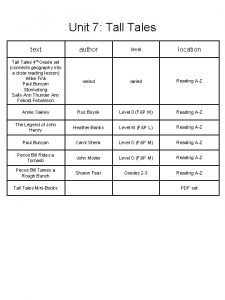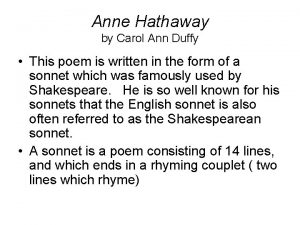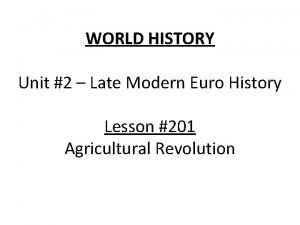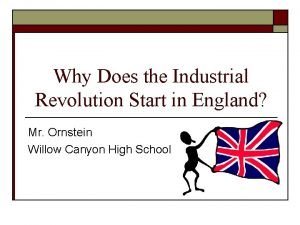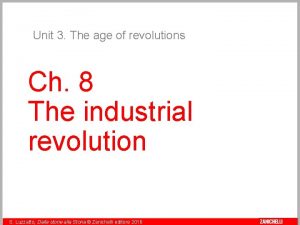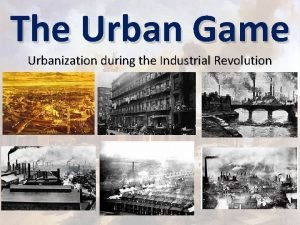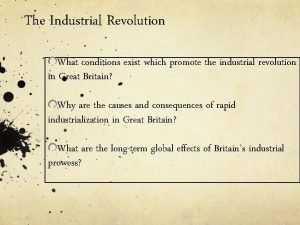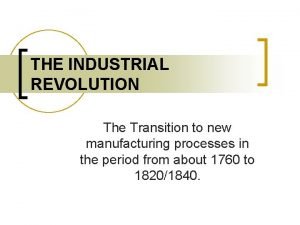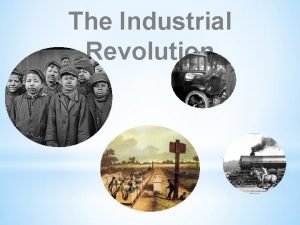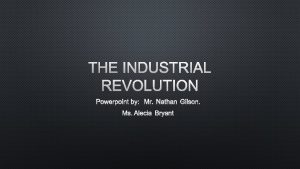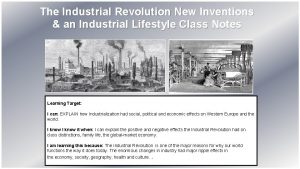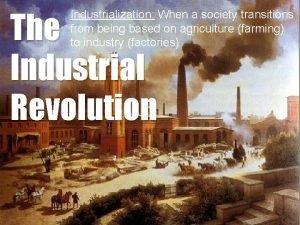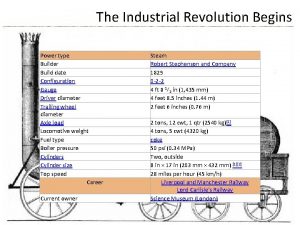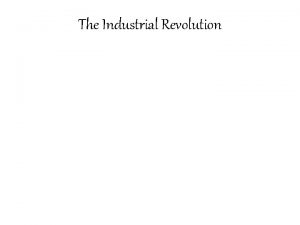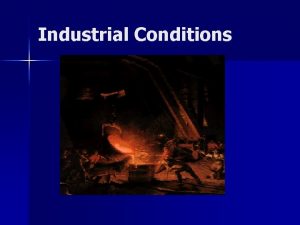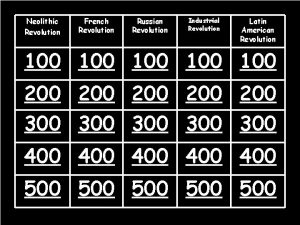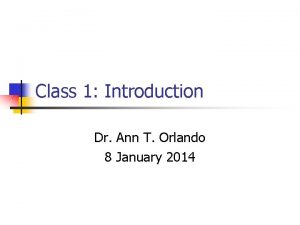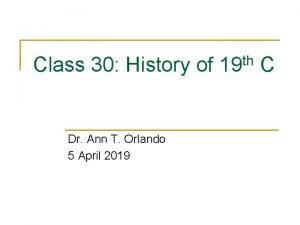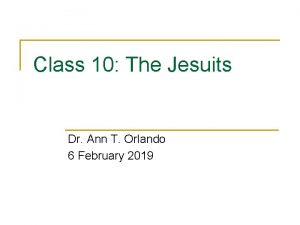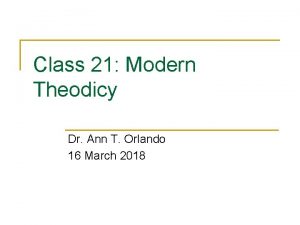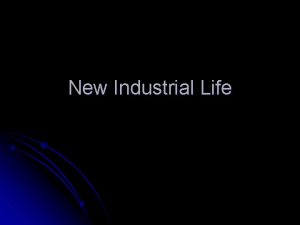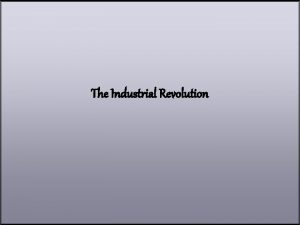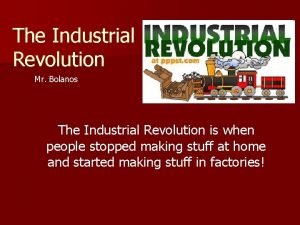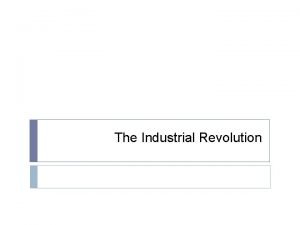Class 32 Industrial Revolution Dr Ann T Orlando
















- Slides: 16

Class 32: Industrial Revolution Dr. Ann T. Orlando 10 April 2019

Introduction n Defining the Industrial Revolution Social and Economic Developments Rise of Workers Movements

Industrial Revolution n Narrowly defined, transformation of England in 18 th C from agricultural to manufacturing as something that employs majority of population q q q n Improved agricultural methods in 17 th and 18 C Application of scientific discoveries: Invention of steam engine and cotton gin Huge economic and social impact in 19 th C But comes to include and define the difference between first world and third world countries

Adam Smith (1723 -1790) n n Born in Scotland, close friend with David Hume Father of modern economics q n Does for economics what Locke did for political philosophy Wealth of Nations (1776) q q q Discover the natural (scientific) principles of economics Each person seeks to maximize his own gain Enters into agreements to ‘barter’ skills for wages In a market of perfect freedom, each person and nation can bargain to own advantage Through free trade the invisible hand of supply and demand ensures that no one is taken advantage of When governments attempt to regulate free trade, then the public welfare and prosperity are threatened

Social Changes Wrought by Industrial Revolution n n Generalization: before Industrial Revolution q Families and small towns fundamental economic as well as social unit; Economic self-sufficiency in small geographic areas q Family farms or farming in common, family artisans; handproduced small quantities; what is sold is crops or crafts q Majority of population is rural q Large towns and cities: seats of ecclesial and civil government Generalization: after Industrial Revolution q Fundamental economic units are large private farms and mercantile organizations q Economic units become very specialized and very large; what the individual sells is his labor (remember John Locke) q Majority of people live around new economic centers: cities q Being rural poor is horrible; being urban poor is worse

Energy for Industrial Revolution n Steam Engine q q n n James Watt patented in 1769 Efficient way to turn coal into energy; England has lots of coal Inventions using steam engines very quickly follow and dramatically change manufacturing But the most visible, and symbolic, immediate invention was the railroad q q q To build railroad required lots of technology, masses of cheap labor directed toward a common economic goal Opened way for mass migration Connected previously independent areas into common economic units

Rail Lines England 1850 www. mtholyoke. edu/courses/rschwart/ind_rev/data/rail_urban 1861. html

So Why Is a Map of England’s Railroads part of Church History? n Because Pope Gregory XVI (1831 -1846) banned railroads from the Papal States q q q n Concerned about disruption to social life in Papal States Concerned about monopoly and materialism of railroads Railroad tried to bribe the Pope Inequality between workers and capitalists, q q Leads to workers revolts of 1848, New political movements, Communism

Background to Revolutions of 1848 n Industrial Revolution had created a class of urban poor laborers q q q n n Disruption in basic social patterns leads to disillusionment with society, including established religions Efforts to change conditions for laborers often united with atheism, or at least separate from religion q n Barely able to survive on subsistence wages Disruption of family (child labor in industry very different from working family farm) Survival of the fittest (Malthus, Essay on Principle of Population, 1789) Reread Charles Dickens, A Christmas Carol, 1843 Religious response q St. Vincent de Paul Society (1833) q YMCA (1844): In 1844, industrialized London was a place of great turmoil and despair. For the young men who migrated to the city from rural areas to find jobs, London offered a bleak landscape of tenement housing and dangerous influences. From YMCA website; http: //www. ymca. net/history/founding. html q Salvation Army (1865)

Gustav Dore Scripture Reader in a Night Shelter groups. msn. com/HOMELESSinbaltimoremd/gustavedore. msnw? action =Show. Photo&Photo. ID=13

Socialism and Communism n n Associated with ‘free thinkers’ Specifically targeted economic and social models (unlike philosophes a century earlier who attacked political models) q n n Opposed to private property Criticized religious response as basically one of keeping the laborer in his place Friedrich Engels, Conditions of Working Class in England (1844)

Prolog Communist Manifest 1848 www. gutenberg. org/dirs/6/61/61. txt A spectre is haunting Europe -- the spectre of communism. All the powers of old Europe have entered into a holy alliance to exorcise this spectre: Pope and Tsar, Metternich and Guizot, French Radicals and German police-spies. Where is the party in opposition that has not been decried as communistic by its opponents in power? Where is the opposition that has not hurled back the branding reproach of communism, against the more advanced opposition parties, as well as against its reactionary adversaries? Two things result from this fact: I. Communism is already acknowledged by all European powers to be itself a power. II. It is high time that Communists should openly, in the face of the whole world, publish their views, their aims, their tendencies, and meet this nursery tale of the spectre of communism with a manifesto of the party itself. To this end, Communists of various nationalities have assembled in London and sketched the following manifesto, to be published in the English, French, German, Italian, Flemish and Danish languages.

What is a Liberal? n n Based on 17 th C word, libertine, meaning one of loose morals; a free thinker In 19 th C, liberals are heirs of philosophes, q q Individual freedom, rights and right to property Fundamental function of government was to safeguard those rights; minimalist governments Notion of a meritocracy Free market economies; ‘invisible hand of market place’

John Stuart Mill (1806 -1873) n Father, James Mill, was an historian and student of Jeremy Bentham q q q n Elected to House of Commons in 1865 as a liberal q n John raised without any religious instruction Was instructed in classical Greek and Roman literature Studied in France and became part of French liberal philosophical scene Champion of women’s rights Philosophical works include q q q Logic and language Scientific method Psychology Politics Moral philosophy of Utilitarianism

Utilitarianism n n Based on work by Jeremy Bentham to find a new basis for morality after the ‘overthrow’ of religion Utility is equated with Epicurean happiness q q n n Maximize pleasure for greatest numbers, minimize pain Actions should be governed by “The Greatest Happiness” as their ends But it is the greatest happiness in this life Dominant moral perspective today

Assignments n n 1. Karl Marx, Scientific Socialism, available at http: //www. fordham. edu/halsall/mod/marxsummary. html 2. John Stuart Mill, Utilitarianism, Chapters 2 and 5, available at http: //www. constitution. org/jsm/util 5. htm
 Tall tale
Tall tale Anne hathaway by carol ann duffy
Anne hathaway by carol ann duffy Russian revolution vs french revolution
Russian revolution vs french revolution Did american revolution cause french revolution
Did american revolution cause french revolution Definition of third agricultural revolution
Definition of third agricultural revolution Enclosure movement industrial revolution
Enclosure movement industrial revolution Why did the industrial revolution start in britain
Why did the industrial revolution start in britain Industrial revolution zanichelli
Industrial revolution zanichelli Industrial revolution drawing
Industrial revolution drawing Enclosure movement industrial revolution
Enclosure movement industrial revolution When was the loom invented
When was the loom invented The transition to new manufacturing processes
The transition to new manufacturing processes Industrial revolution quiz
Industrial revolution quiz Industrial revolution powerpoint
Industrial revolution powerpoint Positive effects of the industrial revolution
Positive effects of the industrial revolution The factory
The factory Industrial revolution
Industrial revolution
